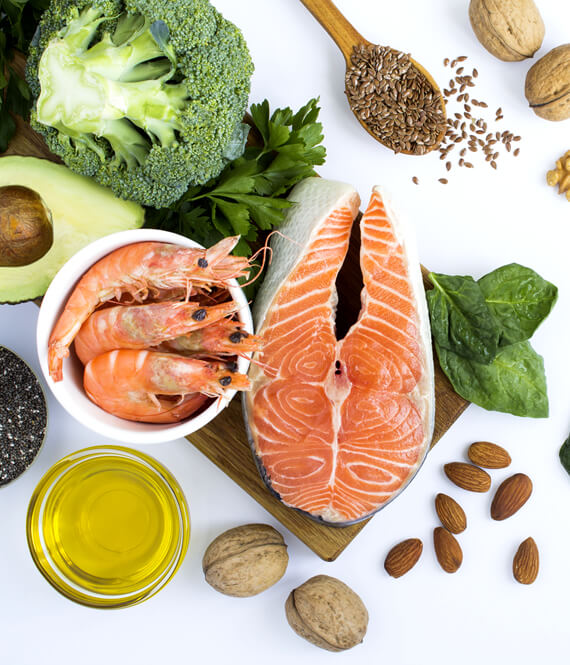
Why Omega 3 Can Be Beneficial In Substance Abuse Recovery
We recommend helpful products in our articles. Read our full disclosure here. The content on this website is not intended to be a substitute for professional advice, diagnosis, or treatment.
Substance abuse disorders have affected many people from all age groups worldwide.
According to a World Mental Health survey by World Health Organization, 3.5% of the population suffers from lifetime drug use disorders.
The high prevalence rate also affects a person’s environmental, social, and personal status.
Different authorities have proposed effective strategies to control the after-effects of drug abuse.
Everything has been discussed in detail and implemented, from rehabilitation centers to social support.
Drug abuse also affects the person’s nutritional status by altering different pathways.
But during the recovery phase, specific nutrients can help the body recover from excessive damage.
The brain is the most affected area during substance abuse.
The mechanism of action of some drugs changes the brain’s neuronal pathways.
Therefore, it is necessary to provide the proper nutrients to your brain so that everything can get back to normal.
Fatty acids and amino acids play a significant role in maintaining brain health.
Omega 3 has always been in discussion regarding substance abuse recovery.
Omega 3 helps in reducing the inflammation in the brain and prevents neuronal cells from damage.
A study shows that omega 3 has promising effects in preventing the relapse of alcohol in people.
It is, therefore, safe to say that omega 3 has a protective role against brain problems.
It is also an effective treatment strategy in controlling substance abuse.

Reasons For Excessive Substance Abuse
Substance abuse is a medical term that describes a pattern of consuming drugs that further result in severe problems and diseases.
Substance abuse can result in mental disorders, physical problems, and behavioral issues.
It also interferes with personal life and can put people in profound dismay.
Following are some of the situations or reasons where a person feels an irresistible feeling to avoid any substance like alcohol, drugs, marijuana, cocaine, hallucinogens, and even in some cases, medicines.
- Environmental stressors may provoke a person to get involved in substance abuse.
- Financial problems are a primary trigger of substance abuse.
- Parental problems, personal life issues, family history, or the loss of a loved one may also make someone addicted to a substance.
It is necessary to identify the pattern of substance abuse.
It will provide a relevant treatment strategy to the person.
It will also reduce the number of relapse episodes.
Apart from counseling, many foods can affect recovery, especially omega three rich foods.
Therefore, it is essential to provide a nutritious meal with enough omega 3 to deal with their health issues.
Role of Omega 3 In Substance Abuse
Omega 3 is a game-changer and a key nutrient to deal with substance abuse and addiction disorders.
The omega-3 fish oil improves the brain’s functions, resulting in positive thoughts, and better mental and physical health.
Omega 3 fatty acids protect the brain from undergoing any inflammation and prevent the demyelination of neurons.
It increases the circulation of blood in the brain and improves the functionality of brain cells to communicate with each other.
Omega 3 helps with substance abuse and deals with dementia, cognitive problems, and age-related brain disorders by reducing inflammation.
Omega 3 also deals with the after-effects of alcohol on the brain.
Overall, it is helpful to have omega-three fish oil supplements or foods containing healthy fatty acids in the diet to subside the effects of substance abuse.

Benefits Of Omega 3 For Substance Abuse Recovery
Substance abuse recovery does not demand recovering the brain functions only.
The heart and other organs are equally affected due to substance abuse.
Omega 3 is a valuable nutrient that plays a role in improving all processes in the body.
Following are some of the benefits of omega 3.
Reduces Overall Inflammation
Omega 3 reduces neuroinflammation and has a prominent role in decreasing overall inflammation in the body.
People suffering from substance abuse often experience an enhanced inflammation problem in their bodies.
With omega 3, the problem can be solved easily – according to research, omega 3 reduces inflammation and deals with oxidative stress.
Speeds Up Recovery
Omega 3 reinforces the brain cells to communicate properly by building strong bonds.
It also protects the layers of the brain and prevents them from damage.
It ensures that all brain cells work properly and send messages to other body parts.
Due to the proper functioning of the brain, the process of recovery speeds up.
Supports Heart Health
Substance abuse poses a high morbidity rate due to increased cases of heart failure.
Certain chemicals in drugs can also alter the normal functioning of the heart.
But, supplementation with omega-3 has shown a visible effect in reducing the incidence of heart diseases, as per research.
Omega 3 also increases cardiovascular fitness due to its anti-inflammatory properties.
Protects Against Behavioral Disorders
Omega 3 is an effective treatment therapy that helps deal with behavioral disorders.
It can help control impulsive behavioral control and deals well with the symptoms of borderline personality disorders.
Other studies show the positive effects of omega three on treating depression and inducing positive changes.
Improves Eye Health
Substance abuse patients can also have some problems in their eyes.
The anti-oxidant effects of omega three help to deal with eye problems as well.
Research also suggests using omega three supplements to improve eye health effectively fighting oxidative stress.
Improves Mood
Mood disorders are a serious threat to patients with substance abuse disorders.
For example, suppose they are not given proper intervention – their urge to use substances increases.
Omega-3 supplements can help in such situations by improving mood, especially among people suffering from depression.
Sources of Omega 3
One of the easiest ways to incorporate omega 3 in your diet is to use more supplements.
They are easy to tolerate and do not negatively affect health.
They also ensure to provide a recommended amount of omega-3 daily.
In addition, omega three fish oil can provide a daily dose of healthy fatty acids to the brain, further improving overall health.
The omega 3 fish oil supplement promotes brain health and improves immune system functions.
It provides a daily dose of 3000 mg of fish oil, which also easily fulfills the requirement of omega 3.
The supplement, along with improving brain health, will also work on other organs and ensure a faster recovery.
Omega 3 rich foods are also a safe option.
These foods include salmon, tuna, mackerel, nuts, almonds, and seeds.
It is essential to add these foods to the diet regularly.
Ways To Recover Faster
Following are some other ways that can help prevent relapse and withdrawal behavior in substance abuse cases:
- Diet: A healthy and nutritious diet can provide energy to such people and help them deal with their everyday routine.
- Supplements: Consuming supplements may help those trying to recover from the after-effects of substance abuse.
Supplements absorb quickly into the bloodstream, thereby reducing the symptoms in a short time.
- Therapy: Counseling and therapy can help the patient of substance abuse identify the root cause of the issue and encourage them to come out of the vicious cycle of substance abuse.
- Support: Social support helps such people identify the problem and initiates feelings of acceptance.
Conclusion
Omega 3 fish oil serves as a promising nutrient to protect the brain from damage.
It also has additional benefits such as improving heart health, protecting skin and hair, improving bone density, enhancing mood, and ensuring better memory.
It is extremely important to rely on some good-quality supplements to fulfill the body’s omega-3 requirements.
The body cannot produce omega-3, so it is crucial to include omega-3 rich foods in the diet.
Seafood, nuts, canola oil, and avocados are some of the common foods you can eat.
With the right food, social support, and other effective strategies, a person can recover from substance abuse easier.
ARTICLE SOURCES
We strive to use high-quality information and deliver content based on science, the latest research, comprehensive studies, or expert advice. These reputable sources have influenced or inspired this article:
- Degenhardt, Louisa, et al. “The Epidemiology of Drug Use Disorders Cross-Nationally: Findings from the WHO’s World Mental Health Surveys.” The International Journal on Drug Policy, vol. 71, Sept. 2019, pp. 103–12. PubMed, https://doi.org/10.1016/j.drugpo.2019.03.002.
- Mahboub, Nadine, et al. “Nutritional Status and Eating Habits of People Who Use Drugs and/or Are Undergoing Treatment for Recovery: A Narrative Review.” Nutrition Reviews, vol. 79, no. 6, Sept. 2020, pp. 627–35. PubMed Central, https://doi.org/10.1093/nutrit/nuaa095.
- Galduróz, José Carlos F., et al. “OMEGA-3 Interventions in Alcohol Dependence and Related Outcomes: A Systematic Review and Propositions.” Current Neuropharmacology, vol. 18, no. 5, May 2020, pp. 456–62. PubMed Central, https://doi.org/10.2174/1570159X18666200128120729.
- Dyall, Simon C. “Long-Chain Omega-3 Fatty Acids and the Brain: A Review of the Independent and Shared Effects of EPA, DPA and DHA.” Frontiers in Aging Neuroscience, vol. 7, Apr. 2015, p. 52. PubMed Central, https://doi.org/10.3389/fnagi.2015.00052.
- Tajuddin, Nuzhath, et al. “Neuroinflammation and Neurodegeneration in Adult Rat Brain from Binge Ethanol Exposure: Abrogation by Docosahexaenoic Acid.” PLOS ONE, vol. 9, no. 7, July 2014, p. e101223. PLoS Journals, https://doi.org/10.1371/journal.pone.0101223.
- DiNicolantonio, James J., and James H. O’Keefe. “Importance of Maintaining a Low Omega–6/Omega–3 Ratio for Reducing Inflammation.” Open Heart, vol. 5, no. 2, Nov. 2018, p. e000946. openheart.bmj.com, https://doi.org/10.1136/openhrt-2018-000946.
- Nishimura, Marin, et al. “The Impact of Substance Abuse on Heart Failure Hospitalizations.” The American Journal of Medicine, vol. 133, no. 2, Feb. 2020, pp. 207-213.e1. PubMed, https://doi.org/10.1016/j.amjmed.2019.07.017.
- Barbarawi, Mahmoud, et al. “Omega-3 Supplementation and Heart Failure: A Meta-Analysis of 12 Trials Including 81,364 Participants.” Contemporary Clinical Trials, vol. 107, Aug. 2021, p. 106458. ScienceDirect, https://doi.org/10.1016/j.cct.2021.106458.
- Karaszewska, Dominika M., et al. “Marine Omega-3 Fatty Acid Supplementation for Borderline Personality Disorder: A Meta-Analysis.” The Journal of Clinical Psychiatry, vol. 82, no. 3, May 2021, p. 32819. www.psychiatrist.com, https://doi.org/10.4088/JCP.20r13613.
- Sikka, Priyanshi, et al. “Exploring the Therapeutic Potential of Omega-3 Fatty Acids in Depression.” Environmental Science and Pollution Research, vol. 28, no. 32, Aug. 2021, pp. 43021–34. Springer Link, https://doi.org/10.1007/s11356-021-14884-5.
- Lafuente, María, et al. “Antioxidant Activity and Neuroprotective Role of Docosahexaenoic Acid (DHA) Supplementation in Eye Diseases That Can Lead to Blindness: A Narrative Review.” Antioxidants, vol. 10, no. 3, Mar. 2021, p. 386. www.mdpi.com, https://doi.org/10.3390/antiox10030386.
- Quello, Susan B., et al. “Mood Disorders and Substance Use Disorder: A Complex Comorbidity.” Science & Practice Perspectives, vol. 3, no. 1, Dec. 2005, pp. 13–21. PubMed Central, https://www.ncbi.nlm.nih.gov/pmc/articles/PMC2851027/.
- Antypa, Niki, et al. “Effects of Omega-3 Fatty Acid Supplementation on Mood and Emotional Information Processing in Recovered Depressed Individuals.” Journal of Psychopharmacology (Oxford, England), vol. 26, no. 5, May 2012, pp. 738–43. PubMed, https://doi.org/10.1177/0269881111424928.
"We love to research problems, examine studies, analyze solutions, and share with you ideas that make life healthier. You can learn about us and our editorial standards here. Have suggestions or feedback to share? Send us a message!."













Leave a Comment